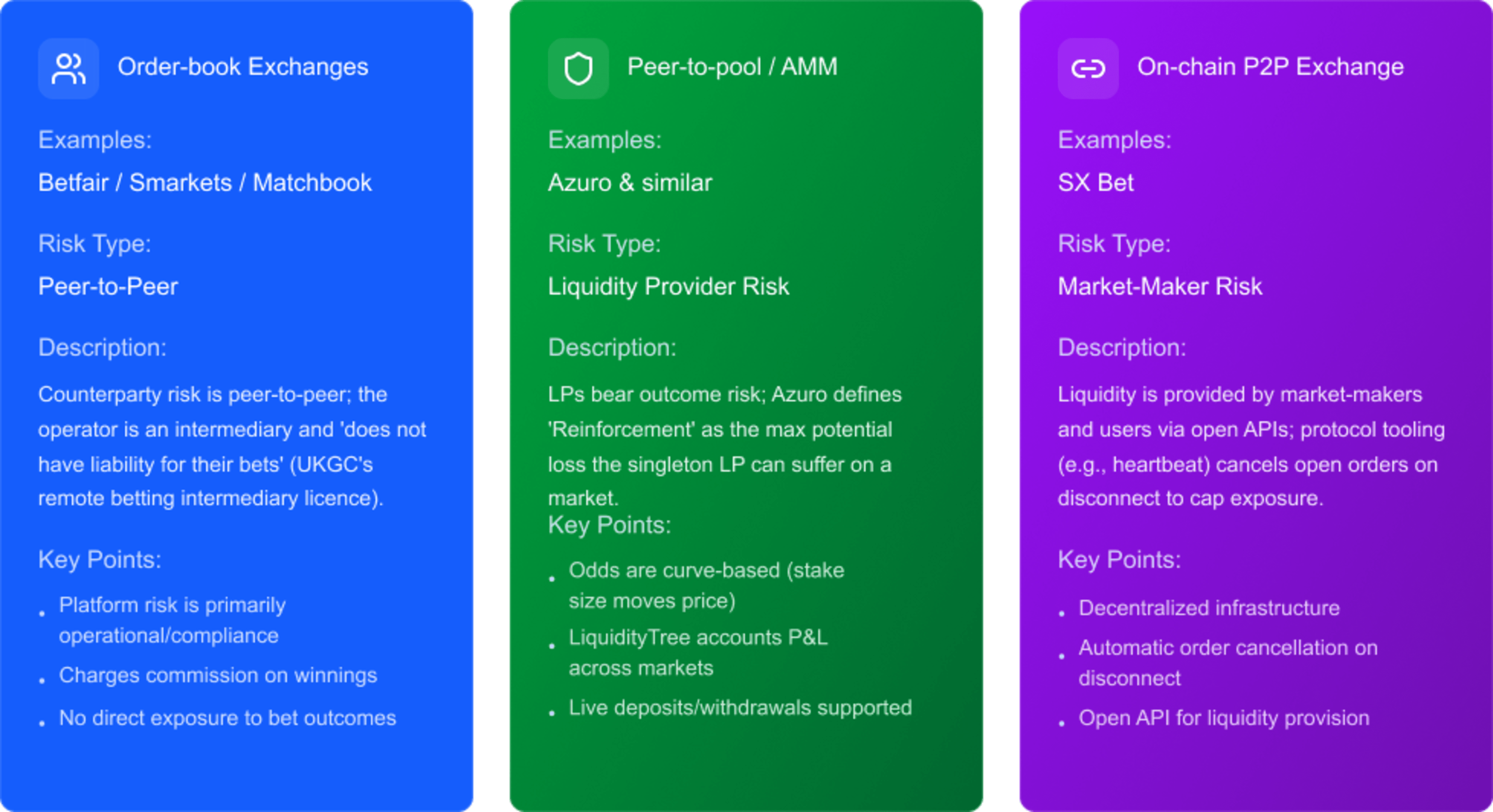Liquidity Pools in Sports Betting: The Next Frontier of Fair Play

Liquidity pools, inspired by decentralized finance (DeFi), are redefining how online sports betting functions. Traditional sportsbooks control odds and margins to secure profits, but liquidity pools introduce a model driven by transparency, efficiency, and shared value. At BettingRanker, we explore how this user-centric system is reshaping the industry and offering Kenyan bettors a more equitable experience.
What Are Liquidity Pools in Sports Betting for Kenyans?
In sports betting, a liquidity pool is a collective wallet funded by many users to support wagering markets. Rather than a sportsbook acting as the counterparty to every bet, the pool holds funds that cover payouts. Users can be both bettors and liquidity providers (LPs), contributing capital back into the system. Smart contracts automatically manage sports betting odds, settle bets, and enforce rules, eliminating much of the human oversight and bias.
This concept is adapted from DeFi, where liquidity pools transformed token trading by providing constant liquidity without order books. In the betting context for Kenyans, the same advantages apply: real-time odds adjustment, automated settlements, and fully auditable transactions. As more people contribute to a pool, market volatility dampens and odds become more stable—benefitting both bettors and providers.
Because the pool is governed by transparent code rather than opaque policy, trust is built into the system. By design, bettors know that once they meet the requirements of the smart contract, payouts are automatic and fair.
Liquidity Pools vs. Traditional Sportsbooks in Kenya
Traditional sportsbooks rely on centralized odds-setting and internal risk management. Bookmakers carry all liabilities and build in a house edge to ensure profitability. This model often requires manual odds adjustment based on betting behavior when betting on sports, exposing it to human bias and delayed reactions.
In contrast, liquidity pool-based platforms operate through smart contracts that execute automatically based on live data. These platforms decentralize risk among liquidity providers, replacing the house edge with service fees. Automation reduces operational costs, increases fairness, and eliminates the conflicts of interest that arise when an operator profits from user losses.
Traditional Sportsbooks vs. Liquidity Pool Platforms
| Feature | Traditional Sportsbooks | Liquidity Pool Platforms |
|---|---|---|
| Odds Control | Centralized (by bookmaker) | Decentralized (via smart contracts) |
| Profit Model | House edge & user losses | Transaction fees |
| Risk Management | Internal hedging | Shared across liquidity providers |
| Transparency | Limited | Full (on-chain visibility) |
| User Role | Bettor only | Bettor + Liquidity Provider |
| Payout Settlement | Manual or delayed | Instant via smart contracts |
Why Kenyan Bettors Are Embracing Liquidity Pools
- Better Returns & Fairer Odds: With no built-in house edge and lower operational costs, liquidity pool models often deliver more favorable returns to bettors. In some systems, payout improvements of 20–30% over traditional offerings are possible. Because profits stem from fee mechanics—not from managing losing bets—the model aligns incentives differently.
- Transparency & Verifiability: Everything—from bet placement to odds changes and settlement—is recorded on-chain. This means bettors can verify that the system followed its rules. There’s no hidden adjustment, delayed settlement, or operator interference behind the scenes. The auditability inherent to blockchain dramatically increases trust.
- Participation as Stakeholders: Liquidity pool models blur the line between bettor and investor. Users may stake capital to the pool and earn fees, effectively giving them a stake in platform performance. This dual-role model encourages deeper engagement and aligns user interests with platform success.
- Lower Counterparty Risk: In centralized betting, users rely entirely on the solvency and honesty of the sportsbook. But in a decentralized pool, funds are held in smart contracts under collective control. That shift greatly reduces the chance of fraud, insolvency, or manipulation by a central operator.
Operator Advantages and Sports Platform Stability in Kenya
Liquidity pool systems also benefit operators by redistributing risk and improving capital efficiency. Rather than absorbing every bet’s liability, platforms share exposure with liquidity providers. Here are some advantages for operators:
- Shared Risk & Capital Efficiency: Instead of absorbing full liability, operators offload risk to liquidity providers, optimizing how capital is allocated.
- Scalable Growth: As pools grow, the system naturally acquires liquidity without requiring proportional capital injections from the operator.
- New Market Expansion: Deep liquidity supports launching new bet types, longer odds markets, and more exotic wagers with less incremental risk exposure.
- Regulatory and Audit Clarity: Because smart contracts are transparent and traceable, operators can more easily demonstrate compliance, fairness, and anti‑fraud mechanisms to regulators.
Together, these elements allow platforms to expand faster, leaner, and with better systemic robustness.
Technological Innovation and Industry Evolution in Spots Betting
Smart Contracts, Oracles & AMMs
Smart contracts form the backbone of a liquidity pool system, but they require precise event data to function properly. Oracles feed real-world sporting outcomes, statistics, and timings into the blockchain to trigger payouts, validate online payment methods' conditions, and adjust odds. In some DeFi‑betting hybrids, oracles are decentralized or multi-sourced to avoid single points of failure or manipulation.
On the pricing side, liquidity pools often rely on automated market maker (AMM) logic or constant-function market maker (CFMM) models, adapting formulas such as x×y=kx \times y = kx×y=k to define how odds shift relative to pool composition. In sports betting, modified AMM logic (for instance, UBET’s UAMM) has been proposed to better align odds with bookmakers’ models.
AI & Machine Learning Optimization
Artificial intelligence and machine learning overlay new intelligence on top of immutable contract logic. These systems can:
- Anticipate betting flows and adjust liquidity parameters dynamically.
- Predict mismatches or imbalances in pool segments and reallocate capital.
- Detect suspicious betting patterns or arbitrage exploits.
- Aid in managing impermanent loss risk by adjusting fee curves adaptively.
By integrating AI/ML, platforms can enhance odds accuracy and system resilience.
Hybrid Models & Industry Adoption
Some established sportsbooks are exploring hybrid structures—combining centralized control and liquidity pool features. These hybrids might retain traditional odds control while opening select markets to decentralized liquidity. This approach provides familiarity to users and operational safety for legacy platforms.
Indeed, several pioneering operators are already piloting full liquidity pool platforms, showing that the concept is more than theoretical—it’s actively being tested in live environments.

Real-World Examples and Regulatory Landscape in Sports Betting
Major Providers with Liquidity Pool or P2P Potential
Several companies are leading or supporting the shift toward decentralized or pool-based betting:
- Playtech – A major sportsbook and iGaming software vendor with the capability to support liquidity pool architecture.
- Evolution – Known for live casino offerings, Evolution’s platform reach makes it a strong candidate for P2P integration, though it lacks current pool-specific features.
- OpenBet – Supplies high-volume sportsbook systems with architecture that supports multi-market liquidity aggregation.
- Longitude LLC – Specializes in pari-mutuel betting and has pioneered shared liquidity pool mechanics in large-scale betting markets.
Different Risk Models in Use
The way platforms manage and distribute risk varies depending on the architecture:
- Order-book Exchanges (e.g., Betfair, Smarkets, Matchbook): Counterparty risk is peer-to-peer. The platform acts as an intermediary without taking liability for user bets. Its income is derived from commissions.
- Peer-to-Pool / AMM (e.g., Azuro): LPs bear the risk of outcomes. For instance, Azuro introduces a "Reinforcement" metric to cap the maximum loss an LP can face. Odds shift based on stake size using an algorithmic curve model.
- On-Chain P2P Exchanges (e.g., SX Bet): Liquidity is sourced from both users and market makers through APIs. Systems like "heartbeat" ensure exposure is capped by canceling open orders when users disconnect.
Where Exchange and P2P Betting Is Permitted
Betting regulation varies globally. The following jurisdictions allow exchange or peer-to-peer betting:
| Country | Regulatory Notes |
|---|---|
| United Kingdom | Licensed under the UKGC as remote betting intermediaries; exchanges like Betfair operate legally. |
| Ireland | Requires a Remote Betting Intermediary Licence; subject to Betting Intermediary Duty. |
| Spain | National legislation includes “Apuestas deportivas cruzadas” (exchange sports betting). |
| Australia | The Northern Territory licenses betting exchanges; Betfair Pty Ltd holds this license. |
| United States | Authorized in some states (e.g., New Jersey) for horse racing and sports wagering under state-specific rules. |
These regions provide blueprints for how decentralized or hybrid models can operate legally and competitively. The trend toward expanding these frameworks is likely as technology and user demand evolve.
Risk Managements Frameworks:

Key Benefits of Liquidity Pools in Sports Betting
Here’s a summary of the standout benefits for bettors and top sports betting platforms:
- For Bettors: Higher potential returns, better odds, and full transparency through blockchain verification.
- For Platforms: Risk decentralization, cost reduction, and simplified compliance with regulatory standards.
Conclusion: The Future Is Transparent and Decentralized
Liquidity pools aren’t just disrupting sports betting—they’re redefining it. By removing centralized control, reducing systemic risk, and empowering users through dual participation, they represent a sustainable and scalable model for the future. Top platforms already adopting this model are demonstrating that decentralized betting is not only viable but highly competitive.
As users demand more transparency, fairness, and financial upside, liquidity pools stand out as the logical evolution. Those who embrace this change early—whether operators or bettors—will be best positioned to benefit in the next era of online betting.
FAQ
What is a liquidity pool in sports betting?
A liquidity pool is a shared pot of funds where bettors pool their money to back sports betting markets. It replaces the traditional bookie with automated smart contracts that handle odds, payouts, and bet settlements.
How is liquidity pool betting different from traditional sportsbooks in Kenya?
Unlike sportsbooks that control odds and profits, liquidity pools use algorithms driven by market activity. Bettors participate directly by placing bets or adding liquidity, making the system more transparent and potentially fairer.
Are liquidity pools legal for online betting in Kenya?
The legality of liquidity pools depends on Kenyan gambling regulations. Their transparency and blockchain foundation can make it easier to demonstrate compliance.
Do liquidity pools offer better odds than sportsbooks?
Yes. Liquidity pools often offer better odds, potentially 20–30% higher, because of lower running costs and no house edge. Odds change in real-time based on betting activity.
Can I earn money by providing liquidity to a betting pool?
Yes. You can earn a share of transaction fees and potentially profit from successful bets by contributing to the pool. This creates an extra income opportunity not found in traditional betting.
How do smart contracts handle sports bets?
Smart contracts automatically adjust odds, take bets, settle bets, and pay out winnings. This removes human error and makes outcomes faster and more reliable.
How secure is liquidity pool betting?
Liquidity pool platforms use blockchain and smart contracts, which lower the risk of fraud and make transactions more transparent. Funds are managed automatically, not by a single company.
What are the advantages of liquidity pools for betting companies?
Companies benefit from shared risk, automated processes, and lower running costs. As the pool grows, the market becomes more stable without increasing the company's risk.
Will traditional sportsbooks start using liquidity pool models?
Yes, some sportsbooks are starting to add decentralized features. Using liquidity elements helps them stay competitive and focus on what bettors want.















